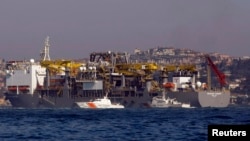ExxonMobil will start exploration drilling at the large Stabroek Block off the coast of Guyana on Friday, the government said, in a move that could inflame a long-running territorial row with neighboring Venezuela.
"They are doing the preparatory work, and actual drilling is expected to commence tomorrow morning,'' Robert Persaud, Guyana's natural resources minister, told Reuters on Thursday.
Guyanese officials said President Donald Ramotar met ExxonMobil officials in Georgetown this week and the company's exploration rig ship, Deepwater Champion, was now in position at the concession area.
The waters lie off a border region claimed by Venezuela in a territorial controversy dating back more than a century.
The two South American nations squabbled over the Essequibo area, which is the size of the U.S. state of Georgia, for much of the 20th century. Venezuela calls it a "reclamation zone,'' but in practice it functions as Guyanese territory.
Ramotar's government says Venezuela has written to Exxon's office in Guyana protesting about the movement of its rig.
In 2013, Venezuela's navy briefly seized a U.S.-chartered oil survey ship and 36 crew members, which was carrying out a seabed survey for Texas-based Anadarko in conjunction with Guyanese authorities, because of the territorial dispute.
Guyana "has requested that the government of the Bolivarian Republic of Venezuela desist from taking any actions that could only result in the stymieing of the development of Guyana and its people and that would be in contravention of international law,'' the government in Georgetown said in a statement.
Venezuelan officials were not available for comment.
In a statement, Exxon said it was operating the block under license from Guyana. "Border disputes are a matter for governments to resolve through bilateral discussions and appropriate international organizations,'' it added.
Exxon signed an agreement with Guyana to explore the block in 1999. It covers 26,800 square kilometers (10,350 square miles) and is 160 to 320 kilometers (100 to 200 miles) offshore.
Oil companies have been increasingly interested in the northeastern shoulder of South America since a discovery off nearby French Guyana in 2011 that industry experts described as a game-changer for the region's energy prospects.





